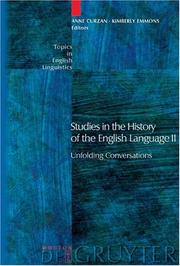| Listing 1 - 4 of 4 |
Sort by
|
Book
ISBN: 9781405112635 9781405112642 Year: 2008 Publisher: Malden, Mass. Blackwell
Abstract | Keywords | Export | Availability | Bookmark
 Loading...
Loading...Choose an application
- Reference Manager
- EndNote
- RefWorks (Direct export to RefWorks)
Book

ISBN: 1282196502 9786612196508 3110205394 9783110205398 9781282196506 311019869X 9783110198690 6612196505 Year: 2008 Publisher: Berlin Boston
Abstract | Keywords | Export | Availability | Bookmark
 Loading...
Loading...Choose an application
- Reference Manager
- EndNote
- RefWorks (Direct export to RefWorks)
Can language change be modelled as an evolutionary process? Can notions like variation, selection and competition be fruitfully applied to facts of language development? The present volume ties together various strands of linguistic research which can bring us towards an answer to these questions. In one of the youngest and rapidly growing areas of linguistic research, mathematical models and simulations of competition based developments have been applied to instances of language change. By matching the predicted and observed developmental trends, researchers gauge existing models to the needs of linguistic applications and evaluate the fruitfulness of evolutionary models in linguistics. The present volume confronts these studies with more empirically-based studies in creolization and historical language change which bear on key concepts of evolutionary models. What does it mean for a linguistic construction to survive its competitors? How do the interacting factors in phases of creolization differ from those in ordinary language change, and how - consequently - might Creole languages differ structurally from older languages? Some of the authors, finally, also address the question how different aspects of our linguistic competence tie in with our more elementary cognitive capacities. The volume contains contributions by Brady Clark et al., Elly van Gelderen, Alain Kihm, Manfred Krifka, Wouter Kusters, Robert van Rooij, Anette Rosenbach, John McWhorter, Teresa Satterfield, Michael Tomasello and Elizabeth C. Traugott. The book brings together contributions from two areas of research: the study of language evolution by means of methods from artificial intelligence/artificial life (like computer simulations and analytic mathematical methods) on the one hand, and empirically oriented research from historical linguistics and creolisation studies that uses concepts from evolutionary theory as a heuristic tool in a qualitative way. The book is thus interesting for readers from both traditions because it supplies them with information about relevant ongoing research and useful methods and data from the other camp.
Linguistic change. --- Creole dialects. --- Language and languages --- Origin of languages --- Speech --- Characterology of speech --- Language diversity --- Language subsystems --- Language variation --- Linguistic diversity --- Variation in language --- Creole languages --- Creolized languages --- Languages, Mixed --- Pidgin languages --- Change, Linguistic --- Language change --- Historical linguistics --- Variation. --- Origin. --- Origin --- Historical linguistics.
Book

ISBN: 9783110252880 9783110252903 3110252902 3110252880 1306968615 Year: 2011 Publisher: Berlin Boston
Abstract | Keywords | Export | Availability | Bookmark
 Loading...
Loading...Choose an application
- Reference Manager
- EndNote
- RefWorks (Direct export to RefWorks)
Innovative, data-driven methods provide more rigorous and systematic evidence for the description and explanation of diachronic semantic processes. The volume systematises, reviews, and promotes a range of empirical research techniques and theoretical perspectives that currently inform work across the discipline of historical semantics. In addition to emphasising the use of new technology, the potential of current theoretical models (e.g. within variationist, sociolinguistic or cognitive frameworks) is explored along the way.
Lexicology. Semantics --- Historical linguistics --- English language --- Semantics, Historical. --- Semantics, Historical --- Historical semantics --- Historical lexicology --- Germanic languages --- Historical Semantics. --- Research Methods in Linguistics. --- Study of English. --- Sémantique historique --- Anglais (langue)


ISBN: 3110180979 3110897660 9783110897661 9783110180978 Year: 2012 Publisher: Berlin Boston
Abstract | Keywords | Export | Availability | Bookmark
 Loading...
Loading...Choose an application
- Reference Manager
- EndNote
- RefWorks (Direct export to RefWorks)
Studies in the History of the English Language II: Unfolding Conversations contains selected papers from the SHEL-2 conference held at the University of Washington in Spring 2002. In the volume, scholars from North America and Europe address a broad spectrum of research topics in historical English linguistics, including new theories/methods such as Optimality Theory and corpus linguistics, and traditional fields such as phonology and syntax. In each of the four sections - Philology and linguistics; Corpus- and text-based studies; Constraint-based studies; Dialectology - a key article provides the focal point for a discussion between leading scholars, who respond directly to each other's arguments within the volume. In Section 1, Donka Minkova and Lesley Milroy explore the possibilities of historical sociolinguistics as part of a discussion of the distinction between philology and linguistics. In Section 2, Susan M. Fitzmaurice and Erik Smitterberg provide new research findings on the history and usage of progressive constructions. In Section 3, Geoffrey Russom and Robert D. Fulk reanalyze the development of Middle English alliterative meter. In Section 4, Michael Montgomery, Connie Eble, and Guy Bailey interpret new historical evidence of the pen/pin merger in Southern American English. The remaining articles address equally salient problems and possibilities within the field of historical English linguistics. The volume spans topics and time periods from Proto-Germanic sound change to twenty-first century dialect variation, and methodologies from painstaking philological work with written texts to high-speed data gathering in computerized corpora. As a whole, the volume captures an ongoing conversation at the heart of historical English linguistics: the question of evidence and historical reconstruction.
English language --- Germanic languages --- Grammar, Historical --- History
| Listing 1 - 4 of 4 |
Sort by
|

 Search
Search Feedback
Feedback About UniCat
About UniCat  Help
Help News
News